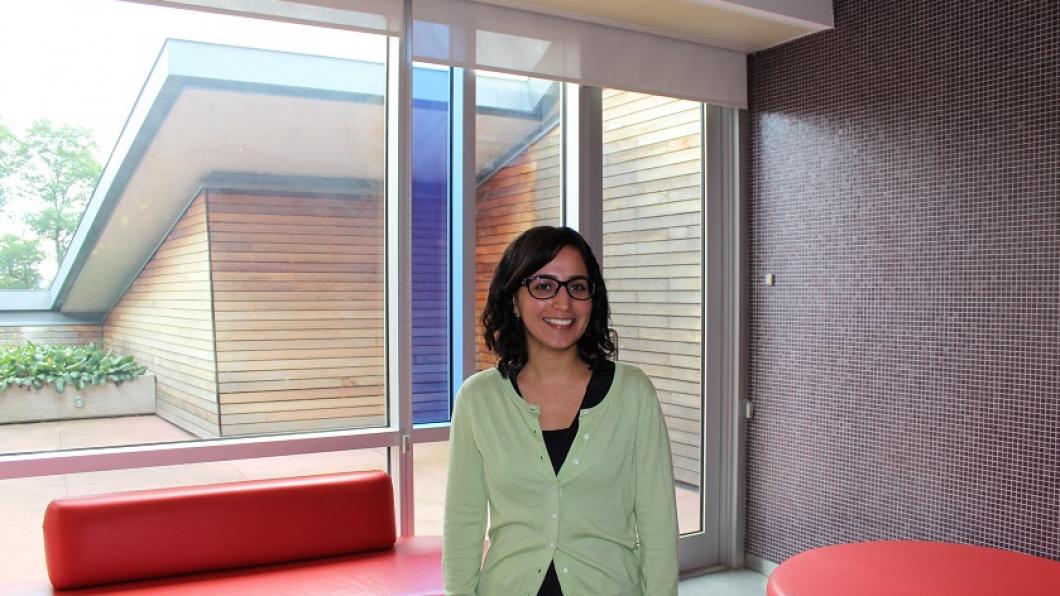
TD will help support on-the-go treatments powered by machine learning and developed by researchers at Holland Bloorview Kids Rehabilitation Hospital’s Bloorview Research Institute
Children with autism and their families will soon have better access to technology-based supports, thanks to a gift from TD Bank Group (TD). This announcement will be made at a virtual gala event tonight hosted by Holland Bloorview Kids Rehabilitation Hospital Foundation.
The $1,005,500 gift from TD will fund research, developed by Dr. Azadeh Kushski, for treatment-on-the-go technologies to support children with autism and their families. Dr. Kushski, a senior scientist at the Bloorview Research Institute’s Autism Research Centre and associate professor at University of Toronto’s Department of Biomedical Engineering, is one of Canada's leading experts on technology and autism.
“We are honoured by TD Bank Group’s generous gift in supporting Dr. Kushki’s important research to give kids with autism and their families a more meaningful future through supports that are more readily available,” says Sandra Hawken, CEO of the Holland Bloorview Foundation. “This gift will also go a long way towards supporting the largest research expansion in our hospital’s history, through increasing capacity in machine learning and artificial intelligence.”
The expansion, to be completed by 2023, will give Holland Bloorview the highest concentration of childhood disability researchers in the world.
“The funding we announced today will help more Canadian children with Autism Spectrum Disorder (ASD) and their families have access to resources and care they need,” says Andrea Barrack, Global Head, Sustainability and Corporate Citizenship. "Through the TD Ready Commitment, the Bank's corporate citizenship platform, we are proud to support these important new technologies. By supporting innovative research and solutions, we can help improve health outcomes for those living with ASD."
A condition affecting one in 66 Canadian children, ASD is the fastest growing developmental condition in the world. Children with autism can experience a great deal of anxiety and many challenges remain in supporting these children in everyday activities.
In response, Dr. Kushki is developing low-cost technologies powered by artificial intelligence that can help support children in everyday settings. These ‘treatment-on-the-go’ technologies will enable kids to practice their skills more often in their home and school settings so they can participate more fully in life.
The support from the TD Ready Commitment will cover three key research projects led by Dr. Kushki:
Anxiety Meter: This wearable technology can track changes in a child’s emotional arousal, such as anxiety levels, using their heart rate that is measured by smart watches and fitness trackers. The information is then displayed to the child and/or caregivers to help de-escalate arousal levels. The Anxiety Meter is an app that can help kids with ASD manage their emotions, such as anxiety.
Virtual Reality as Exposure Therapy: A trip to the dentist can be anxiety provoking for many children. Dr. Kushki’s research team and the clinicians at the Holland Bloorview Dental Clinic will examine if virtual reality technology can help reduce this anxiety. To test this hypothesis, the research team plans on running a study next spring with some 100 children who attend the dental clinic at Holland Bloorview to test the effectiveness of virtual reality on reducing children’s anxiety. The dental immersive experience was created in partnership with Shaftesbury Technology.
Augmented Reality System: Many children have trouble with their sleep routines – falling and staying asleep, or even staying in their own beds. Holland Bloorview offers a sleep training clinic to help kids and their parents develop an effective sleep routine. Dr. Kushki is working with these clinicians to enhance the sleep interventions by using augmented reality to motivate kids to stay on track with their sleep training, and for parents and healthcare providers to track their child’s progress. This may be done by downloading an app onto one’s mobile phone, which can then project a virtual character -- or ‘sleep coach’ -- onto a child’s environment (for example, a character can sit on their bed), making the sleep routine more engaging and fun.
“Thanks to TD, we can focus on partnering with families and clinicians so we can bring these technologies out of the lab and into the real world for families,” says Dr. Kushki.